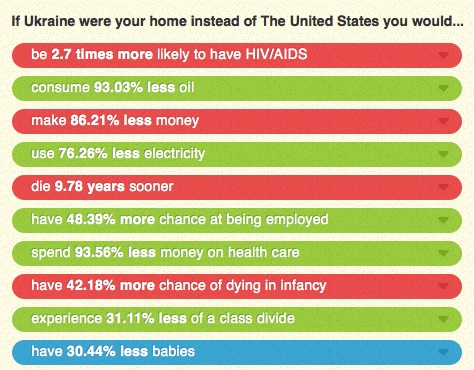Dmitriy T.M. sent in a link to the website If It Were My Home. The site allows you to select two nations and then explains how your life would compare if you lived in each one in terms of rates of HIV/AIDS, employment, energy consumption, infant mortality, class inequality, and other factors (based on CIA data). As an example, Dmitriy chose to compare the U.S. and Ukraine, “the 2 greatest countries in the world, as determined by the poll conducted in my head”:
You can then choose one of the items for more details; I selected life expectancy:
The site is set up with the U.S. as one of the default comparisons, but at the top there’s a button that lets you select a non-U.S. comparison. (Note: Reader Parodie says it appears to detect whatever country you’re accessing the site from and set that as one of the default comparisons.) It’s a fun site that you can spend quite a bit of time playing around with.
UPDATE: Just a caution–a couple of readers seem to have found situations where the math doesn’t add up in the comparisons of some countries. And other readers noted that this does an enormous amount of averaging, which definitely hides the differences in quality of life in various countries, which are so extreme in some nations that “averages” might be nearly meaningless.



Comments 30
parodie — May 18, 2011
Actually, it seems to detect your country and set that as the default. At least it did for me...
Benji — May 18, 2011
Only took a short look at it.
Some stuff seems to be a failure in calculating.
e.g. it says you have ~25% more free time in Germany than in the US, while actually you work ~25% less. This is obviously not the same in all situations. Figures out to be ~5% more free time in Germany.
Jawnita — May 18, 2011
You know, I try not to be a prescriptivist jerk, but "less babies" made me imagine an amorphous baby-blob.
Sam — May 18, 2011
What I find interesting is how they seem to classify things as good or bad with the green and red colors (except for the number of babies). Using less electricity and less oil, and spending less on health care is seen as a good thing. Spending less on health care is great if it's still available to you, but that probably isn't the case in all of these countries.
Meera — May 18, 2011
I was surprised by the much, much lower figures for oil and electricity use -- the Ukraine, for much of the year, is cold! Lots of heavy sweaters, or what?
. — May 18, 2011
Some informations are wrong/outdated, still, despite the fact that here in Brazil the econoy is growing, we are worse than a lot of in crisis countries
Vee — May 18, 2011
Ukrainian-born, living in America, I have to say this definitely caught my eye. Clicking around out of curiosity, comparing different countries to one another was fascinating. I did have a small quip with some of the factoids, however, which Sam picked up on earlier- the tendency to color code some things such as electricity and oil usage.
In the case of Ukraine, the figures are much less than the U.S., and the user-friendly green color seems to imply that this is somehow 'better'. In reality, this is more a reflection of income than any tendency to be environmentally friendly. People just can't afford to buy as many appliances, or use as much electricity, as people can in the United States. My grandmother, for instance, lives in the middle of a large city, and did not have any electrical appliances other than a small fridge and a phone until 2005.
The matter of petroleum oil is much the same- not everyone can afford cars. In rural areas, you can get by walking or riding a horse-drawn cart- in a large city you may be so lucky as to have public transportation. Hence, people use less oil because they own less cars- this doesn't really indicate quality in their standard of living or environmentalism.
I think some of these definitely apply to other developing countries, as well.
Anonymous — May 18, 2011
Interesting as these stats don't account for the experience of being Black in America (or Canada in my case). While one can take the average experience of Canadians and conclude that life is "better," given the significantly higher rates of AIDS infections among African-Canadians, significantly higher unemployment, lower life expectancy, etc. this tells me little about the actual realities of my life in Canada, nor how it would compare to, say, my family in the Caribbean.
Jonathan — May 18, 2011
There should be two numbers for life expectancy. The first is the normal, overall life expectancy. The second should be the life expectancy of only people who've survived to age 5. This is relevant because The Ukraine's lower life expectancy is mostly due to its higher infant mortality rates.
Kat — May 18, 2011
I have not been able to figure out how to choose the first country (as in: not the US).
But what is really flawed is that given that it compares the average, the information "You will earn x more/less" is complete BS for many developed countries.
Fedup — May 18, 2011
Am I the only one who is sick of these comparison websites and lists? What purpose do they serve except to promote Western superiority and denigrate developing countries? I recognise that there are certain ideal standards that we need to meet, especially with regards to health, poverty, child mortatlity etc, but all that these comparisons, rankings etc seem to do is label certain countries as "bad". How about some practical ideas on how to improve their situations rather than looking down our nose at them?
Anonymous — May 19, 2011
At first, I thought "consume less oil" meant consuming less cooking oil, in terms of eating. I quickly realized my mistake, but I thought the ambiguity was interesting.
Nirrti — May 19, 2011
I live in Memphis TN which has one of the highest infant mortality rates in the developed world and has a high rate of poverty and unemployment. It would be interesting if someone from Memphis were to move to the Ukraine. Would their chances of finding employment and having a child survive the first year increase even if they are in a supposedly less well-off country?
American Ties (I-III)/International Comparisons « Welcome to the Doctor's Office — May 21, 2011
[...] INTERESTING INTERNATIONAL COMPARISONS WEBSITE by Gwen Sharp [...]
Clinton B. Maldonado — January 9, 2025
The clean, minimalist design emphasizes the beauty of the content while ensuring user-friendly navigation. One important aspect to consider for optimal website performance is using an vps indonesia, which could significantly enhance the loading speeds and overall user experience for visitors in that region. Overall, the sketches are a great starting point for a visually appealing and functional website.